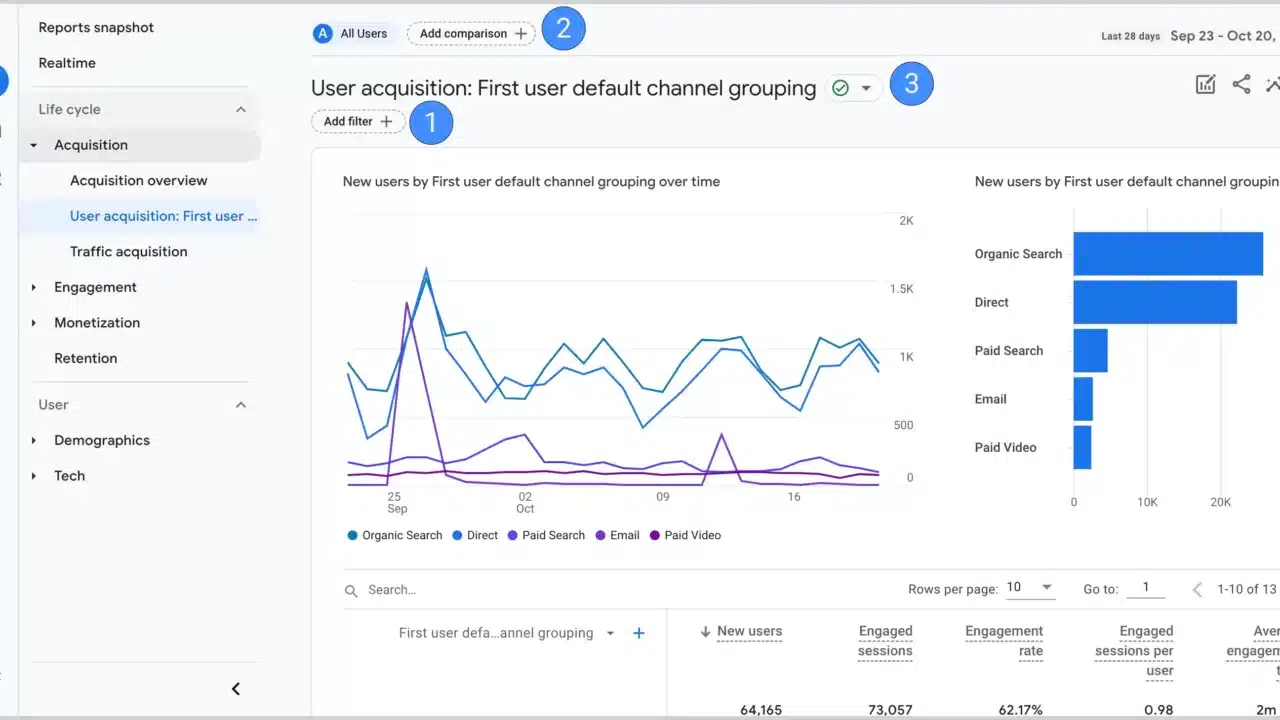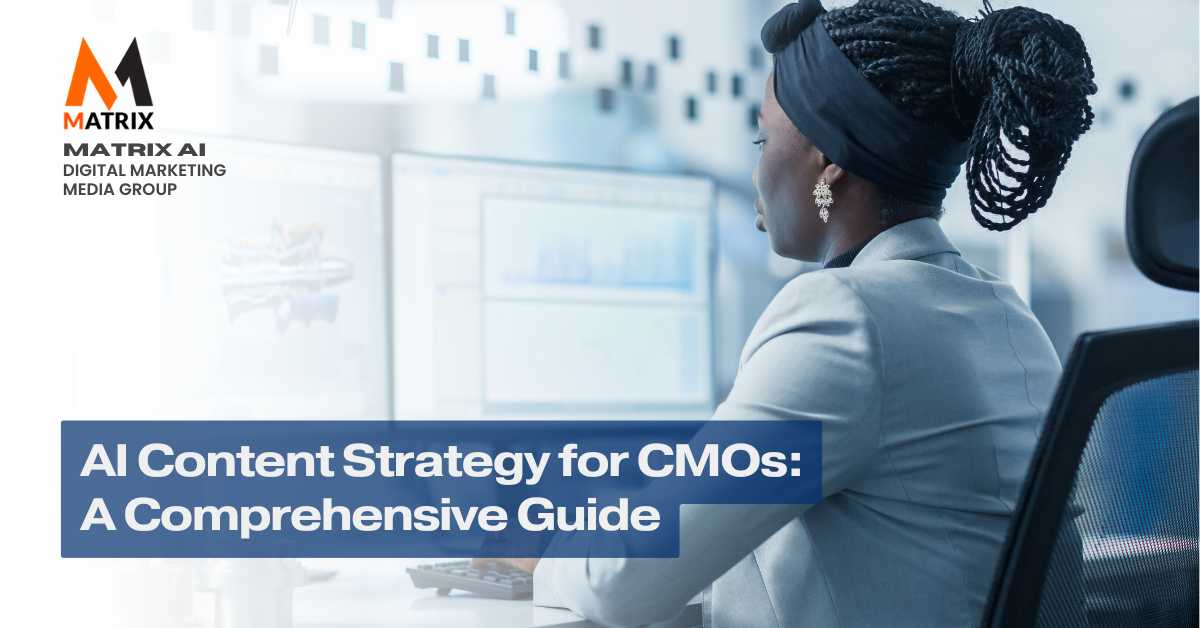Maximizing Marketing Impact with AI-Driven Content Strategies
AI Content Strategy as a Master Chef in the Kitchen
Imagine a bustling restaurant kitchen. With years of experience, the head chef knows how to blend flavors, choose the freshest ingredients, and create dishes that leave diners craving more.
However, the kitchen is incredibly busy, and the chef needs to prepare hundreds of dishes each night. To keep up with the demand, the chef enlists the help of an advanced sous-chef—an AI-powered cooking assistant.
The AI sous-chef doesn’t just follow recipes. It analyzes data from customer preferences, reviews, and even social media trends. It knows which dishes are the most popular and can suggest tweaks to make them even better.
The AI also handles the more tedious tasks, like chopping vegetables, measuring ingredients, and even precisely plating dishes. This allows the head chef to focus on the creative aspects—creating new recipes, experimenting with flavors, and ensuring every dish meets the restaurant’s high standards.
With the AI sous-chef, the kitchen becomes more efficient, the dishes are more personalized to the diners’ tastes, and the overall dining experience is elevated. The restaurant’s reputation grows, and more customers flock to experience the unique blend of human creativity and AI precision. How to Choose the Right AI Digital Marketing Agency: A Comprehensive Guide for Marketing Managers
The CMO and the AI Assistant

Sara was the CMO of a thriving e-commerce company. Her team was constantly pressured to produce engaging content that resonated with their diverse customer base. Every week, they struggled to keep up with the demand—blog posts, social media updates, email campaigns, product descriptions, and more. Despite their best efforts, Sara knew they were missing the mark on personalization and efficiency.
One day, during a marketing conference, Sara attended a session on AI-driven content strategy. The speaker discussed how AI could help marketers analyze vast amounts of data, automate content creation, and deliver personalized experiences at scale. Intrigued, Sara decided to incorporate AI into her team’s workflow.
Sara introduced an AI assistant to the content strategy at the office. At first, her team was skeptical. They were used to crafting content by hand, and the idea of an AI tool writing for them seemed impersonal.
However, as they began to use the AI assistant, they noticed a change. The AI quickly analyzed customer data and suggested content topics aligned with current trends and audience preferences. It generated first drafts of blog posts and product descriptions, which the team could refine and perfect.
The AI assistant also personalized email campaigns, tailoring content to individual customer behaviors and preferences. Optimizing AI Content: A Comprehensive Guide
What used to take days now takes hours, and the quality of the content has improved significantly. Sara’s team has more time to focus on strategy, creativity, and refining the brand’s voice.
Within a few months, the company saw a marked increase in customer engagement and sales. Their content was more relevant, timely, and effective.
Sara’s decision to integrate AI into their content strategy transformed her team’s work. The AI assistant wasn’t just a tool but a trusted partner that helped them achieve more than they ever thought possible.
The lesson was clear: AI wasn’t here to replace human creativity—it was there to enhance it, making the impossible possible and allowing Sara’s team to shine in new and exciting ways.
I. Introduction
A. Importance of AI in Modern Marketing
Artificial intelligence (AI) has become a cornerstone of modern marketing strategies in today’s rapidly evolving digital landscape. AI’s increasing role in marketing is driven by its ability to process vast amounts of data, automate tasks, and deliver personalized experiences at scale.
As consumer behavior becomes more complex and expectations rise, marketers need tools to help them stay ahead of the curve. AI can meet and exceed these demands by enabling more intelligent, efficient, and impactful marketing efforts.
AI’s influence extends across various marketing facets, from predictive analytics to customer service chatbots and programmatic advertising to content creation.
Integrating AI into marketing processes allows businesses to optimize strategies, reduce costs, and achieve better ROI. However, marketing leaders, especially chief marketing officers (CMOs), must adopt a strategic approach to AI-driven content to leverage AI’s potential fully.
B. Purpose of the Article
This article aims to guide CMOs in effectively leveraging AI in their content strategies. It provides a comprehensive understanding of AI’s role in content marketing, outlines the key components of an AI content strategy, and shares best practices for implementation.
Additionally, this article will explore real-world case studies, address common challenges, and offer insights into future trends, ensuring that CMOs are well-equipped to navigate the evolving landscape of AI-driven content marketing. Best Practices for AI Content Creation
II. Understanding AI in Content Marketing
A. What is AI in Content Marketing?
AI in content marketing refers to using artificial intelligence technologies to create, personalize, distribute, and analyze content.
AI tools can automate repetitive tasks, generate content based on specific guidelines, and provide insights into audience preferences and behavior.
This allows marketers to deliver more targeted and relevant content, ultimately enhancing the customer experience and driving better business outcomes.
AI’s scope in content marketing is broad, encompassing various applications such as:
- Content Creation: AI-powered tools can generate articles, social media posts, product descriptions, and other types of content based on input parameters. These tools use natural language processing (NLP) and machine learning algorithms to produce human-like text.
- Personalization: AI can analyze user data to create personalized content experiences. This includes personalized email campaigns, dynamic website content, and tailored recommendations based on individual preferences and behavior.
- Analytics: AI-driven analytics tools can process large datasets to provide insights into content performance, audience engagement, and trends. These insights help marketers optimize their content strategies and make data-driven decisions.
B. Benefits of AI for Content Strategy
The integration of AI into content strategy offers several key benefits that can significantly enhance a company’s marketing efforts:
- Increased Efficiency and Productivity: AI automates time-consuming tasks such as content generation, data analysis, and distribution. This allows marketing teams to focus on higher-value activities like strategy development and creative imagination, ultimately increasing overall productivity.
- Enhanced Personalization and Customer Experience: AI enables marketers to deliver highly personalized content experiences by analyzing vast amounts of customer data. This leads to more relevant and engaging interactions with the audience, fostering stronger relationships and improving customer satisfaction.
- Improved Decision-Making with Data-Driven Insights: AI tools provide actionable insights by analyzing data at a scale and speed that would be impossible for humans to achieve manually. These insights help marketers identify trends, optimize content performance, and make informed decisions that drive better results.
III. Key Components of an AI Content Strategy
A. AI-Powered Content Creation
One of the most transformative applications of AI in content marketing is content creation.
AI-powered tools like GPT models, Matrix AI, and Copy.ai can generate various content types, from blog posts and social media updates to product descriptions and email newsletters.
These tools use machine learning algorithms to analyze existing content and produce new text mimicking human writing. What is an AI Content Assessment?
Tools for Automated Content Generation:
- GPT Models: Developed by OpenAI, GPT models are advanced language models that can generate human-like text based on input prompts. These models are trained on vast datasets and can create contextually relevant and coherent content.
- Jasper AI: Jasper is a popular AI writing assistant that helps marketers generate high-quality content quickly. It offers a range of templates and customization options, making it a versatile tool for various content needs.
Best Practices for Integrating AI-Generated Content:
While AI-generated content can save time and resources, it’s essential to maintain a balance between automation and human oversight. Here are some best practices:
- Human Review and Editing: Always have a human editor review and refine AI-generated content to ensure it aligns with your brand voice and meets quality standards.
- Use AI as a Supplement, Not a Replacement: AI should complement human creativity and expertise, not replace it. Use AI to generate ideas or create first drafts, but rely on human writers for final polishing.
- Test and Iterate: Test AI-generated content to see what resonates with your audience. Use feedback and analytics to refine and improve the content over time.
B. AI-Driven Content Personalization
Personalization is a critical component of modern marketing, and AI allows for delivering highly tailored content experiences at scale.
AI can analyze user data to segment audiences and create personalized content that speaks directly to individual preferences and needs.
Techniques for Audience Segmentation and Targeting:
- Behavioral Analysis: AI can track user behavior across various channels and platforms, allowing marketers to segment audiences based on actions, interests, and engagement levels.
- Predictive Analytics: AI can predict future behavior and preferences by analyzing past data. This enables marketers to proactively anticipate customer needs and deliver content that meets those needs.
Examples of Personalized Content Experiences:
- Dynamic Website Content: AI can adjust website content in real-time based on a user’s profile, behavior, and preferences. For example, an e-commerce site can display personalized product recommendations based on past purchases.
- Email Campaigns: AI can create personalized email content tailored to each recipient’s interests and behavior. This can include personalized subject lines, product recommendations, and offers.
C. AI for Content Distribution
Effective content distribution is crucial for ensuring your content reaches the right audience at the right time.
AI can optimize distribution channels and use predictive analytics to maximize the impact of your content.
Optimizing Content Distribution Channels:
- Programmatic Advertising: AI-driven programmatic advertising automates buying ad space based on predefined criteria. This ensures your content is displayed to the most relevant audience segments across various platforms.
- Social Media Management: AI tools can automate the scheduling and posting of content across social media platforms, ensuring that your content is distributed at optimal times for maximum engagement.
Predictive Analytics for Content Placement and Timing:
- Content Placement: AI can analyze audience data to determine the best platforms and channels for distributing your content. This helps ensure that your content reaches the most relevant audience segments.
- Timing: AI can predict the best times to publish content based on audience behavior patterns, ensuring your content is seen when your audience is most active.
D. AI in Content Performance Analytics

Measuring the effectiveness of your content is critical for optimizing your strategy and achieving your marketing goals.
AI-driven analytics tools can provide deep insights into content performance, helping you understand what works and doesn’t.
Tools for Tracking and Measuring Content Effectiveness:
- Google Analytics with AI Enhancements: Google Analytics uses machine learning to provide insights into user behavior, helping marketers identify trends and patterns in content performance.
- HubSpot’s AI-Powered Analytics: HubSpot offers AI-driven analytics tools that provide detailed reports on content performance, audience engagement, and conversion rates.
Leveraging AI to Optimize Content Strategy:
- A/B Testing: AI can automate A/B testing by analyzing different content variations and determining which performs best. This allows marketers to continuously optimize their content based on real-time data.
- Content Recommendation Engines: AI-powered recommendation engines can suggest content topics, formats, and distribution strategies based on audience preferences and performance data.
IV. Best Practices for Implementing AI in Content Strategy

A. Start Small and Scale Gradually
When implementing AI in your content strategy, starting with small, manageable projects and gradually scaling based on results is important.
This approach allows you to test AI tools, refine your strategy, and build organizational buy-in.
Piloting AI Initiatives with Clear Objectives:
- Define Clear Goals: Identify specific goals for your AI initiatives, such as improving content efficiency, increasing personalization, or enhancing analytics capabilities.
- Select the Right Tools: Choose AI tools that align with your goals and can be easily integrated into your existing workflows.
- Monitor and Measure: Track the performance of your AI initiatives closely and adjust your strategy based on the results.
Scaling Based on Results and Learnings:
- Iterative Process: Refine your AI strategy using the insights gained from your pilot projects. Gradually expand the use of AI across other areas of your content marketing efforts.
- Organizational Alignment: Ensure all stakeholders are on board with the AI strategy and understand its benefits. Provide training and support to help teams adapt to new tools and processes.
B. Maintain a Human Touch
While AI can automate many aspects of content marketing, it’s crucial to maintain a human touch to ensure that your content remains authentic and resonates with your audience.
Ensuring AI Complements Human Creativity and Decision-Making:
- Collaborative Approach: Encourage collaboration between AI tools and human teams. For example, AI can be used to generate content ideas but relies on human writers to craft the final narrative.
- Human Oversight: Always have a human review and approve AI-generated content before it’s published. This ensures that
The content aligns with your brand’s voice and values.
Avoiding Over-Reliance on AI and Maintaining Brand Authenticity:
- Brand Consistency: Ensure that AI-generated content adheres to your brand guidelines and maintains a consistent tone and style.
- Engagement: Use AI to enhance, not replace, human interactions. For example, AI can automate customer service responses, but humans should always handle complex or sensitive issues.
C. Data Management and Ethics
Effective AI-driven content marketing relies on high-quality data. Additionally, ethical considerations must be considered to avoid pitfalls such as bias and privacy violations.
Importance of High-Quality Data for AI Effectiveness:
- Data Accuracy: Ensure that the data used for AI analysis is accurate, up-to-date, and relevant. Data quality can lead to correct insights and effective content strategies.
- Data Integration: Integrate data from various sources to view your audience comprehensively. This allows AI tools to generate more accurate and actionable insights.
Ethical Considerations in AI-Driven Content:
- Bias: Be aware of potential biases in AI algorithms and data sets. Regularly review and update your AI tools to minimize bias and ensure fair and equitable content strategies.
- Privacy: Ensure your AI-driven content strategies comply with data privacy regulations like GDPR. Obtain proper consent before using customer data for personalization and analytics.
D. Continuous Learning and Adaptation
The AI landscape constantly evolves, and staying ahead of the curve requires continuous learning and adaptation.
CMOs must keep up with the latest AI advancements and industry trends to ensure their content strategies remain effective.
Keeping Up with AI Advancements and Industry Trends:
- Ongoing Education: Invest in ongoing education and training for your marketing team to inform them about the latest AI tools, techniques, and best practices.
- Industry Conferences and Events: Attend industry conferences, webinars, and events to stay updated on AI developments and network with other marketing professionals.
Iterating and Refining AI Strategies Based on Performance Data:
- Agile Approach: Adopt an agile approach to your AI content strategy, regularly reviewing performance data and adjusting as needed.
- Feedback Loops: Establish feedback loops to gather input from your team and customers. Use this feedback to improve your AI-driven content efforts continuously.
V. Case Studies

A. Successful AI Content Strategies in Action
To illustrate the impact of AI on content marketing, let’s explore some real-world examples of brands that have successfully implemented AI-driven content strategies. AI Product Management: Why Software Product Managers Need to Understand AI and Machine Learning
Example 1: Coca-Cola
Coca-Cola has used AI to enhance its content marketing efforts by analyzing social media conversations and consumer sentiment.
This has allowed the brand to create more relevant, engaging content that resonates with its audience. AI also helps Coca-Cola personalize its marketing messages, resulting in more effective campaigns.
Example 2: Netflix
Netflix uses AI to drive its content recommendation engine, a key component of its user experience.
By analyzing viewer behavior and preferences, AI helps Netflix deliver personalized content recommendations that keep users engaged and subscribed. This AI-driven strategy has been instrumental in Netflix’s success and growth.
Example 3: Matrix AI
With the use of AI in digital marketing, Matrix Marketing Group had a team of 12 content designers and writers for its clients.
The cost center was about 1.2 million dollars per year, and we were able to reduce the cost center by 75% and still produce content better and faster than they were before.
The marketing operation ran within 6 months, generating text, voice, and video better and faster. How? With prompt engineering, workflow tunning., and grounding the ML models.
B. Lessons Learned
These case studies offer valuable lessons for CMOs looking to implement AI in their content strategies:
- Leverage AI for Personalization: Personalization is a powerful tool for engaging audiences and driving conversions. Use AI to analyze customer data and deliver tailored content experiences.
- Focus on Data Quality: The effectiveness of AI-driven content strategies depends on the data quality used. Ensure that your data is accurate, relevant, and comprehensive.
- Maintain a Balance: While AI can automate many tasks, balancing automation and human oversight is important to ensure your content remains authentic and aligns with your brand values. MatrixAI uses humans in the loop to ensure accuracy.
VI. Challenges and Considerations

A. Common Challenges in AI Implementation
Implementing AI in content strategy comes with challenges that CMOs must be prepared to address.CMOs face challenges implementing AI in content strategy, but they can harness AI’s potential. Considerations include data quality, ethics, human-machine collaboration, compliance, talent gap, personalization, and ROI. By proactively addressing these challenges, CMOs can position their organizations as digital-age leaders.
Technical Hurdles, Cost, and Resource Allocation:
- Integration Issues: Integrating AI tools with existing systems and processes can be complex and require significant technical expertise.
- Costs: Implementing AI solutions can be costly, especially for smaller organizations. When making investment decisions, it’s important to consider the long-term ROI.
- Resource Allocation: Allocating the necessary resources, including time, budget, and personnel, is crucial for successful AI implementation.
Resistance to Change and Organizational Buy-In:
- Change Management: Introducing AI into content marketing may need more support from team members accustomed to traditional methods. Effective change management is key to overcoming this resistance.
- Stakeholder Buy-In: Gaining buy-in from key stakeholders, including executives and department heads, is essential for securing the necessary support and resources for AI initiatives.
B. Overcoming Challenges
To successfully implement AI in your content strategy, developing strategies for overcoming these challenges is important.
To successfully implement AI in your content strategy, developing strategies for overcoming these challenges is important. Here are some additional tips:
- Start small and scale up. Only try implementing AI across your entire content marketing operation at a time. Start with a small pilot project and then gradually scale up as you become more comfortable with the technology and its benefits.
- Get buy-in from key stakeholders. Before you start implementing AI, getting buy-in from key stakeholders, such as your CEO, CMO, and other senior executives, is important. This will help ensure you have the necessary resources and support to succeed.
- Invest in training and education. Your team will need to be trained on how to use AI tools and technologies effectively. This training should cover both the technical aspects of AI and the strategic considerations for using AI in content marketing.
- Monitor and measure your results. It’s important to monitor and measure the results of your AI-driven content marketing efforts to see what’s working and what’s not. This will help refine your strategy and improve your results over time.
Strategies to Address Common Challenges:
- Phased Implementation: Start with small AI projects and gradually scale up as your team becomes more comfortable with the technology.
- Collaboration: Foster collaboration between technical and marketing teams to ensure smooth integration and use of AI tools effectively.
- ROI Focus: Emphasize AI’s long-term benefits and ROI to gain buy-in from stakeholders and justify the investment.
Tips for Gaining Stakeholder Support:
- Demonstrate Value: Use pilot projects and case studies to demonstrate the value of AI-driven content strategies and how they can contribute to the organization’s goals.
- Communicate Clearly: Clearly communicate to all stakeholders the benefits of AI, including increased efficiency, improved personalization, and better decision-making.
- Provide Training: Offer training and resources to help team members adapt to AI tools and processes, reducing resistance and fostering a culture of innovation.
VII. Future Trends in AI and Content Strategy
### Future Trends in AI and Digital Marketing
The future of AI in digital marketing promises to revolutionize the way brands engage with consumers, offering unprecedented levels of personalization and efficiency.
As AI technologies advance, marketers will increasingly rely on these tools to create hyper-personalized experiences.
This shift is driven by AI’s ability to analyze vast amounts of data in real time, allowing marketers to deliver content and offers tailored to individual preferences and behaviors.
Shortly, consumers can expect even more dynamic and interactive digital experiences, where AI predicts their needs before they articulate them, making marketing more intuitive and customer-centric.
Another significant trend is the rise of AI-driven content creation and curation. With natural language processing and machine learning advancements, AI tools will become more adept at generating high-quality content that resonates with specific audience segments.
These tools will automate routine content tasks and assist in crafting complex narratives that align with brand messaging.
Marketers will use AI to test various content variations, optimizing them in real time to ensure maximum engagement. As AI becomes more integral to the content creation, it will empower marketers to produce large volumes of tailored content at scale without sacrificing quality or creativity.
AI will also play a pivotal role in enhancing predictive analytics and decision-making in digital marketing. Predictive AI tools will allow marketers to anticipate consumer trends, optimize campaign strategies, and allocate resources more effectively.
By leveraging AI-driven insights, marketers can make more informed decisions that boost ROI and drive business growth.
For example, AI can predict the best times to launch campaigns, identify emerging market opportunities, and even forecast customer lifetime value. This data-driven approach will enable marketers to stay ahead of the competition by responding to market changes with agility and precision.
Finally, ethical considerations and transparency will become increasingly important as AI evolves. Marketers will need to navigate issues such as data privacy, algorithmic bias, and the responsible use of AI in consumer interactions.
Industry standards and regulations to ensure that AI is used ethically and transparently in digital marketing will likely develop in the future.
Brands prioritizing ethical AI practices will build trust with their consumers and differentiate themselves in an increasingly crowded marketplace. As AI reshapes the digital marketing landscape, its responsible adoption will be key to long-term success.
A. Emerging AI Technologies
The future of AI in content marketing is promising, with several emerging technologies set to transform the industry.
Overview of Upcoming AI Tools and Innovations:
- AI-Generated Video Content: AI tools are increasingly used to create content, including automated video editing and personalized video experiences.
- Voice-Activated Content: As voice search and smart speakers become more prevalent, AI enables the creation of voice-activated content that can be accessed through voice commands.
- Advanced Natural Language Processing (NLP): NLP technology is becoming more sophisticated, allowing AI tools to understand and generate more nuanced and contextually accurate content.
B. The Evolution of AI in Marketing
AI’s role in marketing continuously evolves, and CMOs must stay ahead of these changes to remain competitive.
Predictions for the Future Role of AI in Content Marketing:
- Hyper-Personalization: AI will enable even more granular levels of personalization, delivering real-time content tailored to individual preferences.
- Content Creation at Scale: AI will continue to advance in its ability to generate high-quality content, allowing marketers to produce content at scale without sacrificing quality.
- AI-Driven Creativity: As AI tools become more sophisticated, they will increasingly enhance human creativity, offering new ways to ideate and innovate in content marketing.
C. Preparing for the Future
To stay ahead of the curve, CMOs must take proactive steps to prepare for the future of AI in content marketing.
Steps CMOs Can Take to Stay Ahead:
- Invest in AI Training: Continuously educate your team on the latest AI tools and techniques to ensure they are equipped to leverage these technologies effectively.
- Experiment with New Technologies: Be open to experimenting with new AI tools and innovations to discover new opportunities to enhance your content strategy.
- Focus on Customer Experience: As AI enables more personalized and engaging content experiences, make customer experience a central focus of your content strategy.
VIII. Conclusion
A. Recap of Key Points
In conclusion, AI offers significant opportunities for CMOs to enhance their content strategies and achieve better marketing outcomes.
By understanding the role of AI in content marketing, implementing key components such as AI-powered content creation and personalization, and following best practices, CMOs can effectively leverage AI to drive success.
CMOs should take the initiative to begin or enhance their AI content strategy today. Start by identifying specific areas where AI can add value, pilot small projects, and scale gradually based on results.
By staying informed about the latest AI advancements and continuously adapting your strategy, you can ensure that your content marketing efforts remain effective and competitive in the ever-evolving digital landscape. Since 2002, Matrix has been helping businesses scale and grow.


